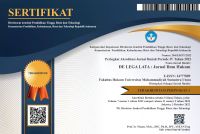Efforts To Achieve Sustainable Development In The Preparation Of Women's Empowerment Policies In Equitable Economic Activities
Abstract
Strengthening women's economy is a good synergy and collaboration of the legislature, executive and community groups. With support for gender equality issues, women can maximize their potential, so that they can become pillars of national economic recovery. The problem is how to implement sustainable development with a gender perspective and how to realize women's empowerment policies in equitable economic activities. The type of research used is normative-empirical juridical. The results are that in the implementation of sustainable development with a gender perspective, there has been inequality that has befallen women. In several aspects of development, women are always the disadvantaged party. In fact, with gender equality, this is relevant to economic growth, because women who think they can support life, both their own lives and their families, will increase their consumption activities which will also affect the level of economic growth. Furthermore, efforts to realize women's empowerment policies in equitable economic activities have been carried out by the Government through several efforts by emphasizing four main sectors, namely in the fields of education, health, employment, and related to the prevention of violence. One of them is in the field of employment, the government focuses on expanding employment opportunities, encouraging labor market gaps, adjusting salaries to market mechanisms, improving workforce skills and capacity with training for women, and strengthening the implementation of labor policies that accommodate gender equality.
Keywords
Full Text:
PDFReferences
Alisjahbana, A. S., & Murniningtyas, E. (2018). Tujuan pembangunan berkelanjutan di Indonesia: konsep, target, dan strategi implementasi. Unpad Press.
Disemadi, H. S., & Prananingtyas, P. (2020). Kebijakan Corporate Social Responsibility (CSR) sebagai Strategi Hukum dalam Pemberdayaan Masyarakat di Indonesia. Jurnal Wawasan Yuridika, 4(1), 1–16.
Hasanah, S. (2013). Pemberdayaan Perempuan Melalui Kegiatan Ekonomi Berkeadilan (Simpan Pinjam Syariah Perempuan). Sawwa: Jurnal Studi Gender, 9(1), 71–88.
Hatneny, A. I. (2017). Koperasi Wanita Dan Pemberdayaan Perempuan Dalam Menumbuhkan Ekonomi Kerakyatan Di Kota Malang. JU-Ke (Jurnal Ketahanan Pangan), 1(2), 66–77.
Hidayat, S. I. (2017). Green City: Solusi Problematika Perkotaan dalam Dimensi Pembangunan. Seminar Nasional Perencanaan Pembangunan Inklusif Desa Kota, 567–576.
KEMENTERIAN KOORDINATOR BIDANG PEMBANGUNAN MANUSIA DAN KEBUDAYAAN. (2019). OPTIMALISASI PERAN PEREMPUAN DALAM PEMBANGUNAN. https://www.kemenkopmk.go.id/optimalisasi-peran-perempuan-dalam-pembangunan
Kuncoro, A., & Kadar, K. (2016). Pengaruh pemberdayaan perempuan dan peningkatan sumberdaya ekonomi keluarga. BUANA GENDER: Jurnal Studi Gender Dan Anak, 1(1), 45–54.
Malau, N. A. (2016). Ekonomi Kerakyatan Sebagai Paradigma Dan Strategi Baru Dalam Pembangunan Ekonomi Indonesia. Jurnal Ilmiah Research Sains, 2(1), 1–8.
Muhammad, A. (2004). Hukum dan Penelitian Hukum. Citra Aditya Bakti.
Prasetyawati, N. (2018). Perspektif Gender Dalam Pembangunan Nasional Indonesia. IPTEK Journal of Proceedings Series, 0(5), 53. https://doi.org/10.12962/j23546026.y2018i5.4421
Putri, C. W. (2022). The Business Permits in Gampong Beurawe Aceh: The Existence of the Current Aceh Qanun. Rechtsidee, 10(1), 10–21070.
Ramadlan, M. F. S. (2013). Revitalisasi dimensi budaya dalam pembangunan berkelanjutan di Madura melalui peran Kiai dan pesantren. KARSA Journal of Social and Islamic Culture, 73–87.
Setiadi, W. (2020). Penundaan Pemilihan Kepala Daerah Pada Masa Pandemi Covid-19 Dalam Perspektif Hukum Administrasi Negara. Jurnal Rechts Vinding: Media Pembinaan Hukum Nasional, 9(3), 427.
Setianingtias, R., Baiquni, M., & Kurniawan, A. (2019). Pemodelan indikator tujuan pembangunan berkelanjutan di Indonesia. Jurnal Ekonomi Dan Pembangunan, 27(2), 61–74.
Styaningrum, F. (2021). Konsep sistem ekonomi kerakyatan dalam pemberdayaan UMKM indonesia. E-Jurnal Ekonomi Dan Bisnis Universitas Udayana, 10(8), 656–663.
Tjiptaningsih, W. (2018). Pemberdayaan perempuan dalam upaya peningkatan ekonomi keluarga (Studi kasus pada kelompok usaha perempuan di desa Sindangkempeng Kecamatan Greged Kabupaten Cirebon).
Utama, A. S. M. S. (n.d.). PENGARUH PEMBERDAYAAN MASYARAKAT TERHADAP COMMUNITY BASED TOURISM DAN KESEJAHTERAAN MASYARAKAT PADA CEKING RICE TERRACE, TEGALLALANG.
Wahid, A. H. (2015). Perbudakan Dalam Pandangan Islam Hadith And Sirah Nabawiyyah: Textual And Contextual Studies. Nuansa: Jurnal Studi Islam Dan Kemasyarakatan, 8(2).
DOI: https://doi.org/10.30596/dll.v9i2.21042
Refbacks
- There are currently no refbacks.
Address:
Faculty of Law, University of Muhammadiyah Sumatera Utara Jl. Kapten Mukhtar Basri No. 3 Medan, Kode Pos 20238
E-mail: delegalata@umsu.ac.id
Telp/HP/WA : 081262102097
DE LEGA LATA: Jurnal Ilmu Hukum is abstracting & indexing in the following databases:
De Lega Lata: Jurnal Ilmu Hukum is licensed under a Creative Commons Attribution-ShareAlike 4.0 International License.
Statcounter










